In 2007, the price was around 94p a litre for premium unleaded and around 99p for lead replacement and super unleaded (leaded petrol is available only from a limited number of suppliers). Diesel fuel is available from most garages and costs 96p, around the same price as premium unleaded – or up to double the price in other EU countries!
The price of fuel varies little, although savings may be made by buying from supermarkets, which have around 20 per cent of the market. Shop around for the best buy, as prices can vary. It’s cheaper in England than other parts of the UK, although some towns with a lot of passing trade (e.g. Dover) are expensive. Prices must be displayed. As one observer commented, a sign of the increasing crime rate in the UK is that every time you stop for petrol you get mugged by a ruthless gang of criminals (the oil companies and the government). Some oil companies provide stamps or saving points, which can be exchanged for gifts, although most motorists would prefer cheaper fuel. The cleanest fuels of all are compressed natural gas (CNG) and liquefied petroleum gas (LPG). Most petrol engines can be converted to use both petrol and CNG/LPG (and can be switched between them). However, its availability is limited. For a list of outlets contact the LP Gas Association, Pavilion 16, Headlands Business Park, Salisbury Road, Ringwood, Hants. BH24 3PB (01425-461 612).
Most petrol stations are open from 8am to 10pm and on motorways they’re usually open 24 hours. It’s no problem finding a petrol station, as all towns usually have at least one. Signs on motorways indicate the distance to the next petrol station. When paying in self-service petrol stations, you simply tell the cashier your pump number (most pumps don’t issue receipts). Outside normal business hours, some petrol stations have automatic pumps accepting £5 or £10 notes.
Most garages provide air (there may be a nominal charge of 10p or you may be given a token if you buy petrol), use of a car vacuum cleaner (fee around 10p) and a car wash (£2 to £6, depending on the type of wash chosen). Beware of car washes with wheels, which can be trapped under body parts and wreck them (e.g. spoilers). Most petrol stations also have a shop selling a wide range of motoring accessories and other goods. In fact, the main business of many petrol stations isn’t selling fuel, on which profit margins are minimal (except for the government!). Today’s petrol stations are more like convenience stores and sell a wide range of confectionery, snacks, drinks (even beer, wine and spirits), pizzas, newspapers and magazines, and take in dry-cleaning (some even have cafés or their own bakery).
This article is an extract from Living and working in Britain. Click here to get a copy now.


